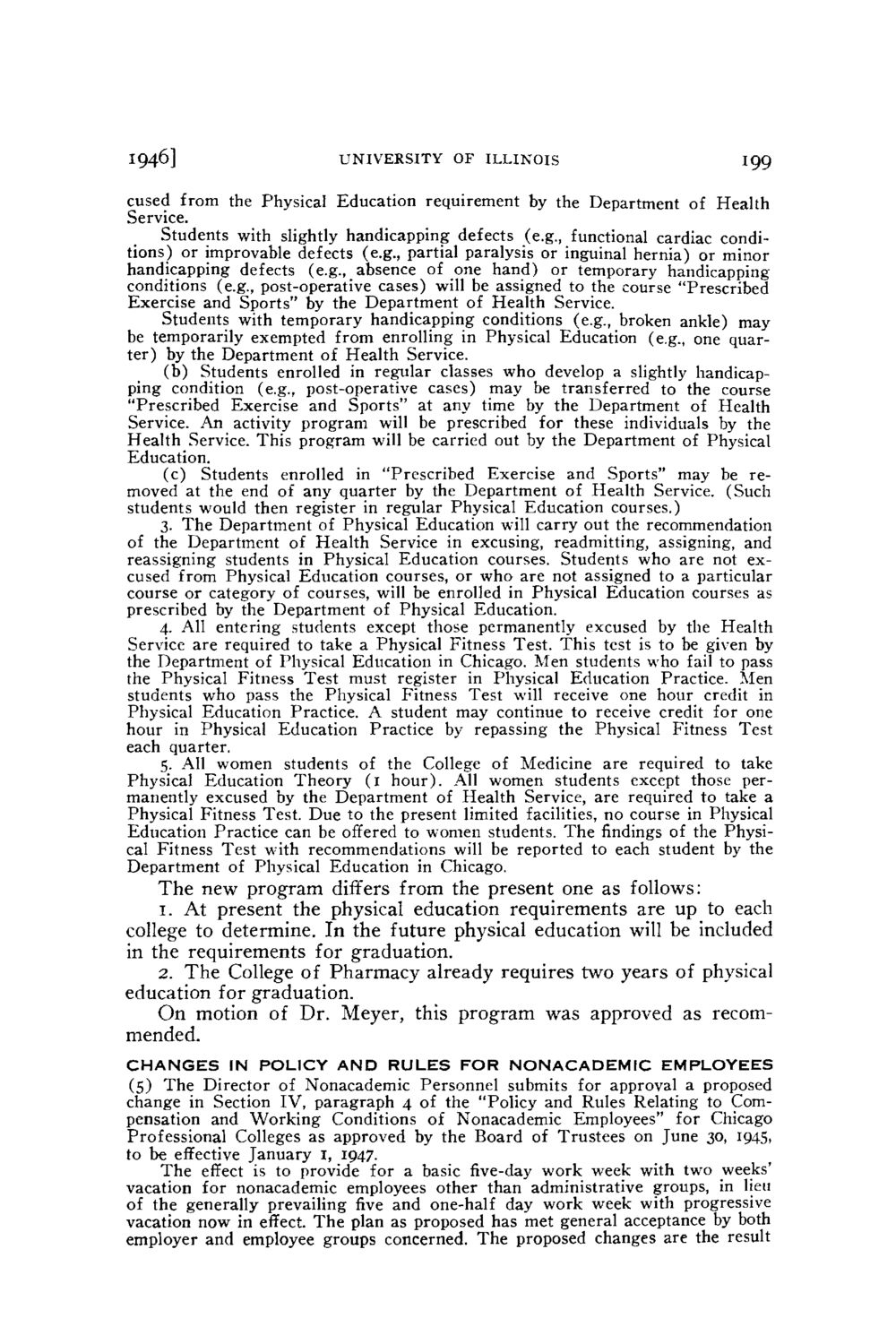| |
| |
Caption: Board of Trustees Minutes - 1948
This is a reduced-resolution page image for fast online browsing.

EXTRACTED TEXT FROM PAGE:
1946] U N I V E R S I T Y OF ILLINOIS 199 cused from the Physical Education requirement by the Department of Health Service. Students with slightly handicapping defects (e.g., functional cardiac conditions) or improvable defects (e.g., partial paralysis or inguinal hernia) or minor handicapping defects (e.g., absence of one hand) or temporary handicapping conditions (e.g., post-operative cases) will be assigned to the course "Prescribed Exercise and Sports" by the Department of Health Service. Students with temporary handicapping conditions (e.g., broken ankle) may be temporarily exempted from enrolling in Physical Education (e.g., one quarter) by the Department of Health Service. (b) Students enrolled in regular classes who develop a slightly handicapping condition (e.g., post-operative cases) may be transferred to the course "Prescribed Exercise and Sports" at any time by the Department of Health Service. An activity program will be prescribed for these individuals by the Health Service. This program will be carried out by the Department of Physical Education. (c) Students enrolled in "Prescribed Exercise and Sports" may be removed at the end of any quarter by the Department of Health Service. (Such students would then register in regular Physical Education courses.) 3. The Department of Physical Education will carry out the recommendation of the Department of Health Service in excusing, readmitting, assigning, and reassigning students in Physical Education courses. Students who are not excused from Physical Education courses, or who are not assigned to a particular course or category of courses, will be enrolled in Physical Education courses as prescribed by the Department of Physical Education. 4. All entering students except those permanently excused by the Health Service are required to take a Physical Fitness Test. This test is to be given by the Department of Physical Education in Chicago. Men students who fail to pass the Physical Fitness Test must register in Physical Education Practice. Men students who pass the Physical Fitness Test will receive one hour credit in Physical Education Practice. A student may continue to receive credit for one hour in Physical Education Practice by repassing the Physical Fitness Test each quarter. 5. All women students of the College of Medicine are required to take Physical Education Theory (1 h o u r ) . All women students except those permanently excused by the Department of Health Service, are required to take a Physical Fitness Test. Due to the present limited facilities, no course in Physical Education Practice can be offered to women students. T h e findings of the Physical Fitness Test with recommendations will be reported to each student by the Department of Physical Education in Chicago. The new program differs from the present one as follows: 1. At present the physical education requirements are up to each college to determine. In the future physical education will be included in the requirements for graduation. 2. The College of Pharmacy already requires two years of physical education for graduation. On motion of Dr. Meyer, this program was approved as recommended. CHANGES IN POLICY AND RULES FOR NONACADEMIC EMPLOYEES (5) The Director of Nonacademic Personnel submits for approval a proposed change in Section IV, paragraph 4 of the "Policy and Rules Relating to Compensation and W o r k i n g Conditions of Nonacademic Employees" for Chicago Professional Colleges as approved by the Board of Trustees on June 30, 1945, to be effective January I, 1947. T h e effect is to provide for a basic five-day work week with two weeks' vacation for nonacademic employees other than administrative groups, in lieu of the generally prevailing five and one-half day work week with progressive vacation now in effect. T h e plan as proposed has met general acceptance by both employer and employee groups concerned. The proposed changes are the result
| |